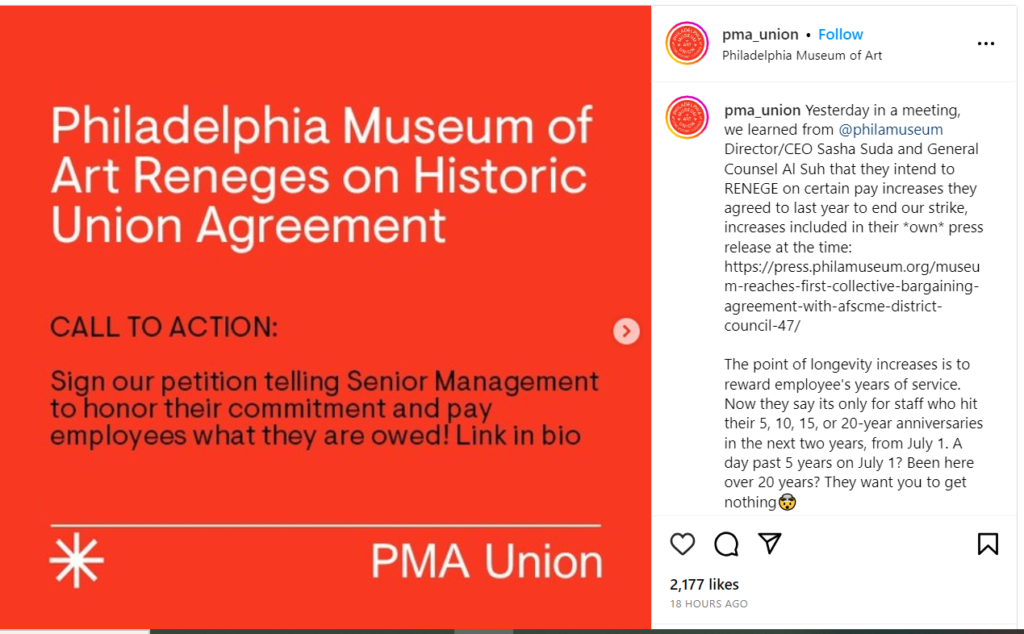The Philadelphia Museum of Art’s (PMA) unionized staff claim top management has reneged on compensation increases stipulated in their initial contract.

The Philadelphia Museum of Art (PMA) Union claims that the institution has broken a mutually agreed-upon compensation clause ratified last October after two years of tense negotiations and a three-week strike. The union claims that PMA General Counsel Al Suh and CEO Sasha Suda informed union leadership in a meeting held yesterday, June 29, that the museum would not adhere to a “longevity pay increase” that would affect staff members across departments.
According to the news sources, the longevity pay increases schedule was originally intended to reward both full- and part-time employees with incremental salary bumps of $500 and $250, respectively, for every five years of employment at the institution (for up to 20 years). For their 10-year employment anniversaries, full-time employees (those who work more than 25 hours per week) would receive an additional $1,000 added to their annual base rate, while part-time employees (those who work less than 25 hours per week) would receive an additional $500. An employee would earn retroactive longevity increases if they had worked at the museum for more than 20 years. As of now, this agreement has been compromised which The PMA has allegedly indicated that as of July 1, the longevity clause would only apply to employees whose employment anniversaries fell within the three-year duration of the contract and that these increases would consist of standalone $500 or $250 bumps rather than cumulative amounts. This implies that rather than receiving a raise proportional with years of service, an employee with a 15-year employment anniversary would receive the same $500 or $250 as an employee with a 5-year anniversary.

In the Instagram post, the union said that the new terms are “not only nonsensical,” but “will have the opposite effect of the intent of the provision. Instead of rewarding employees equitably and fairly for their service, management will be causing even greater inequity and chaos to prevail in the PMA pay structure.”
In August 2020, 180 PMA employees cast unionization ballots during a wave of labor unrest at cultural institutions across the nation. 180 members of the PMA Union, a district council 47 affiliate of the American Federation of State, County, and Municipal Employees, overwhelmingly approved the contract last year, ending a 19-day strike. With the union rejecting the museum’s initial offer of pay rises of 8.5 percent over the next 10 months and 11 percent by July 1, 2024, negotiations on the subject of salary had come to a standstill.
The museum has added another controversy to its expanding list of grievances. Rizzo said the contract is in full effect otherwise, and that it included a no-strike/no-walk-out clause. “We’ve commenced our three-step grievance process, and if that fails, we’re prepared for arbitration,” Rizzo said. “That would likely take place in winter, though, so it’s a long and drawn-out process.”
The union is planning other pressure-applying measures in the interim, such as informational pickets, demonstrations, email campaigns, and a petition that will be delivered to the museum’s administration and Board. Rizzo urged sympathetic backers to express their worries and dissatisfaction to the museum via email or in person. On social media, some supporters stated that they would not cancel their museum memberships in favor of the union.

“We’ve never asked members to withdraw their memberships, but that was a powerful motion during our strike,” Rizzo mentioned.
The PMA has not yet responded to the union’s criticism regarding the late-hour exception to the contract terms.


